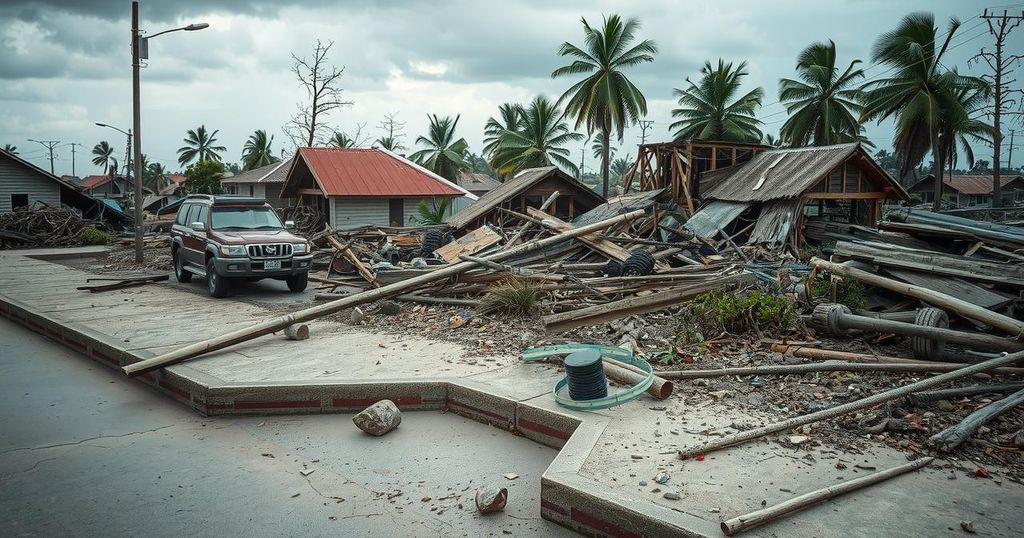Cyclone Chido Devastates Northern Mozambique, Affecting 90,000 Children

Cyclone Chido has significantly impacted northern Mozambique, displacing approximately 90,000 children and affecting over 174,000 individuals. The cyclone destroyed over 35,000 homes and critical infrastructure, including schools and health facilities. The humanitarian crisis worsens as the region deals with pre-existing challenges and a cholera outbreak, necessitating immediate international support and assistance.
Tropical Cyclone Chido has recently ravaged northern Mozambique, leading to widespread destruction in the Cabo Delgado province. The storm has reportedly affected approximately 90,000 children, with over 35,000 homes either destroyed or damaged. Current figures indicate that around 174,000 individuals have been impacted as assessments continue in the aftermath of the cyclone. In terms of infrastructure, at least 186,000 classrooms have been obliterated, and 20 health facilities have sustained damage since the cyclone made landfall on Sunday.
Cyclone Chido struck near Pemba, Cabo Delgado, where it devastated civilian infrastructure, including roofs and essential services such as electricity and communication systems. Mary Louise Eagleton, the UNICEF Representative in Mozambique, stated that “Mozambique is considered one of the most affected countries in the world by climate change and children were already experiencing several life-threatening emergencies before Cyclone Chido, including conflict, drought, and disease outbreaks.”
The Cabo Delgado region has faced over seven years of ongoing conflict, creating over 1.3 million internally displaced individuals, predominantly women and children. This new natural disaster exacerbates the existing hardships faced by many, further compounding the pre-existing struggles of countless families. The cyclone also affected nearby Nampula and Niassa provinces, with over 25,000 families losing power and sustaining damage to water facilities. With a cholera outbreak already impacting the area, the cyclone’s aftermath poses serious health risks.
In the first 48 hours post-cyclone, the UN refugee agency, UNHCR, delivered essential aid to over 2,600 individuals in Pemba, providing life-saving items such as blankets and sleeping mats. The spokesperson for UNHCR, Eujin Byun, emphasized that “preliminary assessments suggest that around 190,000 people urgently need humanitarian assistance, 33 schools have been affected, and nearly 10,000 homes were destroyed. In some villages, very few houses remain standing.”
In response to the disaster, United Nations Secretary-General António Guterres remarked that UN teams are on the ground assisting with emergency relief endeavors. The Emergency Relief Coordinator, Tom Fletcher, has allocated $4 million towards early humanitarian responses in Mozambique. Notably, the World Food Programme (WFP) has indicated plans to escalate assistance amidst projections of heightened food insecurity affecting nearly 3.3 million individuals in the coming year.
Additionally, Cyclone Chido has similarly afflicted Mayotte, a French overseas territory, causing fatalities and infrastructure impairments, as well as impacting asylum seekers and refugees. It has also caused damage in southern Malawi, prompting the agency to monitor the situation closely and coordinate with local organizations. The humanitarian implications of Cyclone Chido are indeed far-reaching and demand swift and concerted efforts from the international community.
Cyclone Chido has emerged as a severe environmental challenge in Mozambique, impacting one of the regions most vulnerable to climate-related events. The Cabo Delgado province, which has been beset by conflict for years, already harbored a population struggling with the aftermath of violence, displacement, and health crises, including cholera. The intersection of these crises, exacerbated by the cyclone, highlights the urgent need for expansive humanitarian assistance and proactive disaster response to alleviate the distress of affected communities.
In conclusion, Cyclone Chido has inflicted catastrophic damage on northern Mozambique, notably affecting children and vulnerable populations in Cabo Delgado and surrounding areas. The destruction of homes, classrooms, and health facilities compels immediate humanitarian intervention, as conditions worsen with ongoing food insecurity and health risks. The international community, alongside national agencies, must prioritize support to mitigate the long-term ramifications of this natural disaster.
Original Source: news.un.org






